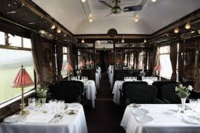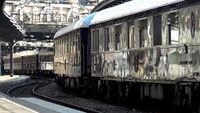West Scipian Railway
This article is incomplete because it is pending further input from participants, or it is a work-in-progress by one author. Please comment on this article's talk page to share your input, comments and questions. Note: To contribute to this article, you may need to seek help from the author(s) of this page. |
| West Scipian Railway Company | |
|---|---|
| Overview | |
| Type | Higher speed rail |
| Status | Operational |
| Locale | Sydalon Ascalzar Yisrael Talakh Messidor Union |
| Termini | Phillipopolis, Sydalon (start/west) Takalt, Messidor Union (end/east) |
| Stations | TBD |
| Operation | |
| Opened | Phillipopolis to Takalt (Primary Line) Ostracine to Didapolis Petra to Gallagán Ashkelon to Phillipopolis Yerushalayim to Didapolis Dervaylik to Modiin Petra to Modiin Gallagán to Nashifah |
| Character | At-grade |
| Technical | |
| Track length | TBD |
| Track gauge | 1,435 mm (4 ft 8 1⁄2 in) |
West Scipian Railway is a transnational long-distance private commuter, passenger, and freight transport train service operated by a private consortium of companies from Sydalon, Yisrael, Ascalzar, Talakh, and the Messidor Union with government backing that form the joint venture the West Scipian Railway Company.
It operates the largest commuter and long-range passenger railway in West Scipia. It was conceived in the aftermath of the 1973 Yarden Accords as a symbolic way to unite the region after decades of war, conflict, and distrust.
Although it is a normal international rail service, it has garnered a reputation in the public eye for political intrigue and luxury travel. The railway or obvious analogues of it have appeared in such formats such as the 1991 murder mystery novel Murder on the Night Train to Sydalon and its 1993 film version, cameoed in the Asher Frum spy films, and was the main background in the 2013 modern geopolitical thriller and alternate history film The Red Sky about a hypothetical "Fifth" West Scipian War between Sydalon and Yisrael.
History
Conception
Consortium formed
Construction
Becoming operational
Today
Lines
The West Scipian Railway has eight lines in its rail network:
- Phillipopolis-Takalt Line: Considered the Primary Line, the Phillipopolis-Takalt line is the longest and most contiguous segment of track in the transnational railway. The entire trip from end-city to end-city take approximately 12 hours and 40 minutes at normal speed. Wealthy foreign visitors from across Belisaria, Latium, Arthurista, Belfras, and elsewhere who are visiting West Scipia on a "grand tour" will often ride the train for the entirety of the line's length, often stopping at each station to visit the area before catching another train continuing on. Business travelers and diplomats also frequent this line as its the main route to several capitals and major commercial hubs, such as Sydalon, Gallagán, and New Aɣmat City.

- Petra-Gallagán Line: A secondary line connecting the main city of Petra in Petra county to Gallagán, the capital city of Ascalzar.
- Ashkelon-Phillipopolis Line: A secondary line connecting the major city of Ashkelon in Yisrael on its west coast to the western terminus of the railway in Phillipopolis, a major Sydalene coastal city.
- Yerushalayim-Didapolis Line: A secondary line in northern Yisrael connecting the Yisraeli capital of Yerushalayim to Didapolis in Sydalon. An important conduit for travel for Yisraeli and Sydalene diplomats, elites, and businessmen.
- Dervaylik-Modiin Line: A short secondary line in northern Yisrael connecting its largest city, Dervaylik, with the Primary Line at Modiin. One of the busiest lines in service, and also the heaviest for daily commuters between both Yisraeli cities.
- Petra-Modiin Line: A short and minor secondary line connecting the easternmost Sydalene domain to the Primary Line at the terminal in Modiin. This route typically has one of the lowest volumes for the railway, although it has a number of daily commuters who have business or high-tech jobs across the Sydalon-Yisrael border.
- Ostracine-Didapolis Line: A secondary line connecting the largest city in Sydalon, Ostracine, to the Primary Line at the major terminal in Didapolis. A heavily-trafficked route for foreign visitors, business travelers, and daily commuters.
- Gallagán to Nashifah Line: A secondary rail-line, known also as the "Talakh Interior Line," connecting the Ascalzari city of Gallagán southeast to the Talakhi capital city of Nashifah.
Organization
The railway is run by a mostly-private joint venture company headquartered in Gran Aligonia. Each country's representative receives an equal share as a shareholder in the consortium. Most are individual companies, many with state backing or direction. For example, the [Syd Crown Corp], a Sydalene Crown enterprise, controls all of the Sydalene share. For the Messidor Union, its Railway Union owns 100% of the MU shareholder. Conversely, for Yisrael, several companies have bought parts of the Yisraeli share, with the Roth Group being the largest single Yisraeli shareholder. Talakh's share is controlled by a state enterprise with representatives who answer to the Emir.
The corporate presidency, with its CEO-like powers, rotates every two years among the national shareholders. For the 2020-2022 term, the Ascalzari lead shareholder Juan Lopez serves as the venture head. Each national shareholder has two seats on the board of directors. Consequently, some shareholders are known to be aligned on many company issues and frequently side with each other on votes on operations, policies, or staffing; e.g. Sydalon and Ascalzar often vote as a team, as does Yisrael and Talakh. Messidor votes with whichever faction supports its interests, such as continuing job security for its railway union.
In its permanent staff, hiring and personnel are selected, like any other private company, through merit and industry credentials, though the venture has tried to balance an international staff from all the countries involved as evenly divided as practical. However, some departments of the venture are heavily "favored" by nationals of one country or the other. For instance, Sydalene make up many middle managers and engineers, while Yisraelis dominate among lawyers and financial analysts; Messidorians have an edge in on-site field personnel such as repairmen and train engineers. This has led to accusations of patronage, corruption, and nepotism, such as well-reported grumbling from some national shareholders towards the Messidorians, who have instituted policies slammed as "protectionist" that ensure all-Messidorian train staff during the railway usage within the Union.
Finances
Each shareholder has invested a set amount into the joint venture, with each country behind that shareholder providing consumption subsidies to ensure sufficient funds for the railway to stay operational. In years with net profits, those profits are distributed evenly among the national shareholders as a lump-sum dividend issued every July 1 of the global calendar.
The railway is listed on the Dervaylik Royal Stock & Bond Exchange as WSR.
Terminals
Major terminals
The West Scipian Railway has three major railroad terminals: Didapolis (Sydalon), Gallagán (Ascalzar), and Modiin (Yisrael).
Didapolis is the largest rail connection point, with the Primary, Yerushalayim, and Ostracine Lines, all heavily trafficked, running through its terminal. This is followed by the Gallagán terminal, an important stop on the Primary Line, and the only station for Ascalene users to embark or disembark in Ascalzar; it is also a recipient of the Petra Line from eastern Sydalon. Lastly, Modiin is the easternmost major terminal, being an important stop on the Primary Line in Yisrael, a recipient of the busy Dervaylik Line, as well as a recipient of the other Petra Line.
Services
Service on the WSR depends on the status of ticket (commuter or traveler), class (daily commuter, regular coach, business, first), and the rail-line utilized.
Passenger
Passengers, whether commuters or travelers, enjoy certain amenities available to all ticketed persons, namely a guaranteed seat, free Wi-Fi internet access, and access to for-purchase food and drink (both alcoholic and non-alcoholic) cars.
Commuter
Commuters, who may buy daily, weekly, monthly, or yearly tickets, either one-way or roundtrip, are assigned to regular coach-style seats in the commuter railroad cars.
Traveler
Regular train passengers, who are not commuters (such as visitors and other travelers) are known as 'Travelers' and entitled to certain services, amenities, and privileges according to the class of ticket they purchase.
Classes
First Class

First Class travelers are assigned to the First Class railroad-car(s), which include large, spacious seats as well as well couches, tables, and other leisurely space. They are afforded complimentary food and alcoholic drinks from the dining car, as well as snacks and food that are otherwise for-purchase by other passengers.
They have access to the entertainment car (a railroad car with several playing tables, a fully-stocked bar, a pool table, and other accompaniments). For overnight trips, they have access to the First Class sleeping car. They are afforded access to the business center car as well.
Business Class
Business Class travelers are assigned to the Business Class railroad-car(s), or if already filled, excess seats in the Regular Coach. They have spacious, but slightly less so, seats and other amenities than First Class. They are afforded complimentary food and two alcoholic beverages from the dining car, but other snacks and drinks are for-purchase.
They, too, have access to the entertainment and business center cars. For overnight trips, they have access to the Business Class sleeping car, which is roughly equivalent if slightly smaller than their First Class co-travelers.
Regular Coach
Regular Coach travelers are assigned to the several Regular Coach railroad-car(s). These cars have standard seating but no tables, couches, or other seating arrangements. They have access to for-purchase food and drinks.
For overnight trips, they have the option to purchase meals and alcoholic drinks in the dining car. On overnight trips only, they may pay for access to the business center car. Regular Coach travelers are assigned to Regular Coach sleeping cars, which are slightly smaller than Business Class.
Availability by line
Overnight accommodations (sleeping cars) are only available on the Primary, Yerushalayim, and Ostracine lines.
First Class is available only on the Primary, Yerushalayim, Ostracine, Ashkelon, and Concordia lines.
Business Class and Regular Coach are available on all lines.
Commuter class is available on all lines, but with a time limit of 2 hours (e.g., a commuter passenger could only travel up to 2 hours and would have to disembark at the station closest to the two-hour mark). On certain train schedules (late night departures, etc.), the WSR close its commuter class availability.
